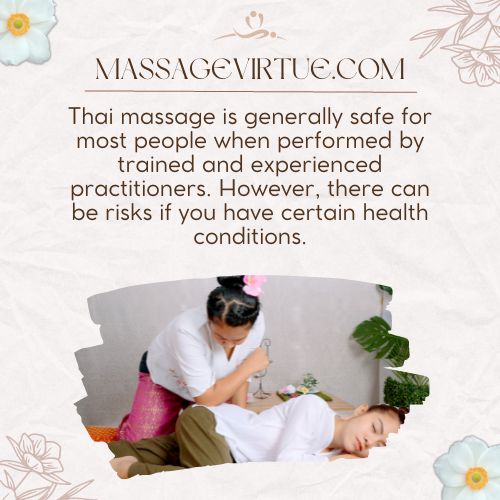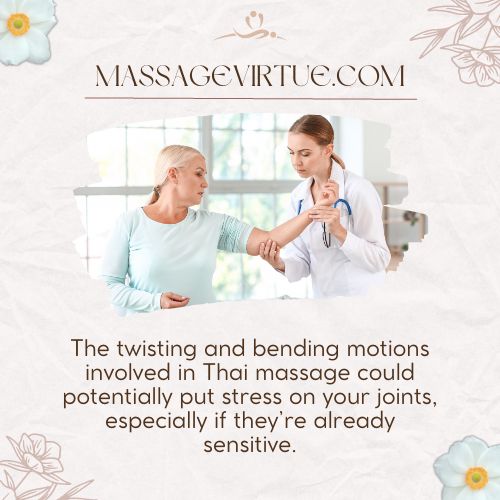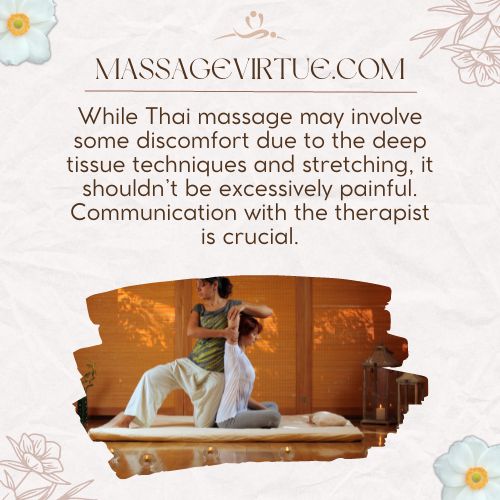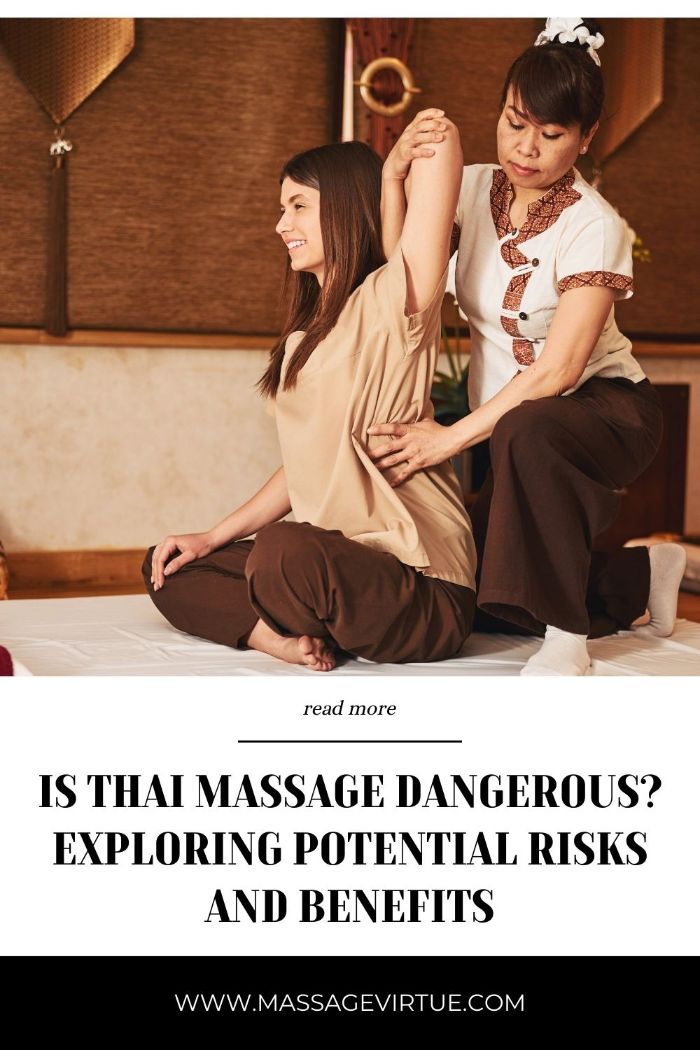Thai massage is renowned for its unique combination of stretching, acupressure, and rhythmic movements that promote relaxation and flexibility.
While it offers numerous benefits, it’s essential to be aware of potential risks.
In this article, we’ll delve into the risks, benefits, and more about Thai massage.
Is Thai Massage Dangerous?
Thai massage is generally safe for most people when performed by trained and experienced practitioners.
However, there can be risks if you have certain health conditions such as fractures, blood clotting disorders, or recent surgeries.

Communicate openly with your therapist about your medical history.
It is important to ensure a safe experience.
Always consult a healthcare professional before getting a massage if you have any concerns about its suitability for your individual health situation.
Dangers of Thai Massage
Thai massage is generally safe. But still, there is some risk associated with it. Let’s explore some of them.
1. Strain and Injury
Engaging in the dynamic stretches of Thai massage can sometimes lead to overexertion, particularly if the practitioner lacks proper training or the client has pre-existing muscle issues.
Pushing your body beyond its limits might result in muscle strain or injury, affecting your mobility and overall well-being.
2. Joint Discomfort
The twisting and bending motions involved in Thai massage could potentially put stress on your joints, especially if they’re already sensitive.

Individuals with conditions like arthritis should exercise caution, as excessive pressure on joints might worsen discomfort and lead to inflammation.
3. Nerve Compression
Although Thai massage aims to alleviate tension, vigorous pressure on specific points might inadvertently compress nerves.
Numbness, tingling, or pain could arise if nerves are pinched during the massage.
Communicating openly with your therapist about pressure levels can help prevent such issues.
Is Thai Massage Painful?
The experience of pain during a Thai massage can vary from person to person.
While Thai massage may involve some discomfort due to the deep tissue techniques and stretching, it shouldn’t be excessively painful.

Communication with the therapist is crucial; they can adjust their techniques based on your comfort level.
It’s essential to remember that the aim is to relieve tension and discomfort, not exacerbate it.
When to Avoid Thai Massage?
To ensure your safety, consider avoiding Thai massage if:
- You have fractures, recent injuries, or open wounds.
- You are pregnant, especially if the therapist lacks prenatal massage experience.
- You have severe osteoporosis or other bone-related issues.
- You suffer from cardiovascular problems or high blood pressure.
- You have a history of blood clotting disorders.
- You’re experiencing acute pain or inflammation.
Thai Massage vs Swedish Massage
| Aspect | Thai Massage | Swedish Massage |
| Origin | Thailand | Sweden |
| Techniques | Stretching, deep tissue, myofascial release | Kneading, gliding, tapping, friction |
| Pressure | Moderate to high, involving stretches and firm pressure | Light to firm, adaptable to client preferences |
| Clothing | Done fully clothed on a mat | Typically done with clients undressed and draped in a sheet |
| Focus | Balancing energy flow, improving flexibility, holistic well-being | Relaxation, muscle tension relief, overall relaxation |
| Pain Level | May involve discomfort due to stretching; should not be excessively painful | Generally not painful; focused on providing relaxation |
| Suitable For | Those seeking deep muscle work, increased flexibility, holistic wellness | Individuals looking for relaxation, muscle tension relief |
Conclusion
Thai massage can offer numerous benefits, from increased flexibility to stress relief, but it’s essential to approach it with caution.
It’s important to be mindful of the risks, especially if you have underlying health conditions.
Communication with your Thai massage therapist and understanding your own body’s limitations are key to ensuring a safe and enjoyable experience.
FAQs
Who Should Not Do Thai Massage?
Individuals with fractures, osteoporosis, cardiovascular issues, or certain medical conditions should avoid Thai massage due to potential risks. Always consult your healthcare provider before trying it.
Are Thai Massages Actually Good for You?
Absolutely yes. Thai massages offer a range of benefits, including enhanced flexibility, stress relief, pain alleviation, improved circulation, and overall holistic well-being.
What Not to Do After Thai Massage?
After a Thai massage, it’s best to avoid intense physical activities, hot baths, and heavy meals. Rest, hydration, and gentle movements are recommended to maximize the benefits.
What Not to Do Before a Thai Massage?
Avoid heavy meals and excessive caffeine intake before a Thai massage. It’s advisable to wear comfortable clothing and communicate any health concerns with your therapist.
What Happens in a Full Body Thai Massage?
During a full-body Thai massage, you remain clothed and lie on a mat. The therapist uses stretching, acupressure, and massage to work through your entire body, promoting relaxation and flexibility.
It’s a holistic experience that benefits the body and mind.


